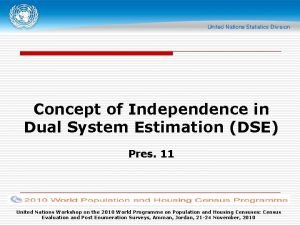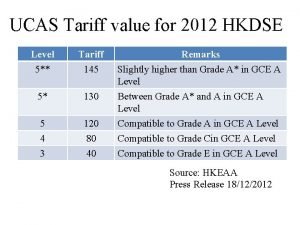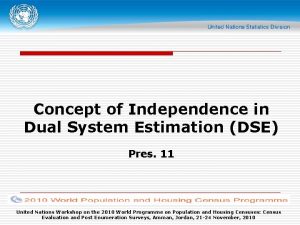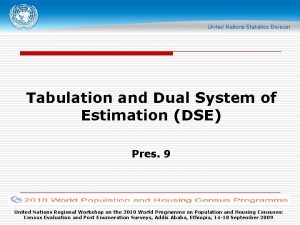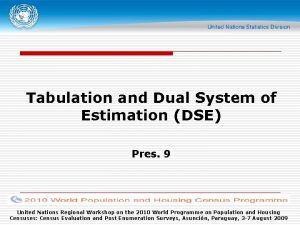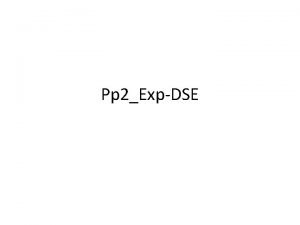Concept of Independence in Dual System Estimation DSE








- Slides: 8

Concept of Independence in Dual System Estimation (DSE) Pres. 11 United Nations Workshop on the 2010 World Programme on Population and Housing Censuses: Census Evaluation and Post Enumeration Surveys, Amman, Jordan, 21 -24 November, 2010

Independence Assumption in Dual System Estimation (DSE) q Two Independent samples --n n PES Sample (P-Sample) Census Sample (E-Sample) q Why Independence Important for DSE n Dual System Estimation methodology assumes independence between P- and E- samples. Hence, it works only if the two samples are independent United Nations Workshop on the 2010 World Programme on Population and Housing Censuses: Census Evaluation and Post Enumeration Surveys, Amman, Jordan, 21 -24 November, 2010

Independence Assumption in Dual System Estimation (DSE) (contd. ) In census Out of census Total In PES Out of PES Total q Based on capture-recapture models q Chandrasekaran-Deming estimator (1949) assuming independence : United Nations Workshop on the 2010 World Programme on Population and Housing Censuses: Census Evaluation and Post Enumeration Surveys, Amman, Jordan, 21 -24 November, 2010

Independence Assumption In Dual System Estimation (DSE) q What Does Independence mean? n n q Independence means that the probabiltiy of being in a (i, j) cell is the product of marginal probabilities of being in margins i and j. Inclusion of a person in P sample does not affect his/her inclusion/exclusion in E sample What causes loss of independence? n n Causal dependence between the census enumeration and the PES enumeration Heterogeneity in capture (enumeration) probability within a post-stratum United Nations Workshop on the 2010 World Programme on Population and Housing Censuses: Census Evaluation and Post Enumeration Surveys, Amman, Jordan, 21 -24 November, 2010

Independence Assumption in Dual System Estimation (DSE) (contd. ) q Causes of causal dependence between census and PES n It occurs when the event of an individual’s inclusion or exclusion from one system (sample) affects his or her inclusion in other system n Some examples of causal dependence: o Some people who answered census may not answer in PES – n thinking that they already answered n thinking that they had helped enough, etc. o An enumerator enumerates an EA in both census and PES n may not list all housholds again thinking that he/she already knows it or any difference would reflect negative on his/her performance n may not interview all housholds again thinking that he/she already knows who lives there or difference in roster would reflect negative on his/her performance n may remember outcome of census enumeration and hence may affect an outcome for PES by doing additional probing United Nations Workshop on the 2010 World Programme on Population and Housing Censuses: Census Evaluation and Post Enumeration Surveys, Amman, Jordan, 21 -24 November, 2010

Independence Assumption in Dual System Estimation (DSE) (contd. ) o Same field managment personnel for an area in both systems n Knowledge of one system results may lead managers to resolve differences in two systems n May decide to use the same address list that was on hand was prepared for the first system n Descrepancy in two systems may lead them to resolve differences o Use the same address list for both systems -- census and PES n Aviod any operation or procedure of one system that has potential to affect other system United Nations Workshop on the 2010 World Programme on Population and Housing Censuses: Census Evaluation and Post Enumeration Surveys, Amman, Jordan, 21 -24 November, 2010

Independence Assumption in Dual System Estimation (DSE) (contd. ) q Heterogeneity in capture (enumeration) probability within a post-stratum n It occurs when either the census inclusion probabilities or the PES inclusion probabilities are not the same. n Some examples: o Some people may try their best not to be enumerated in both census and PES. This results in much lower inclusion probabilities for them than other persons o Some demographic group members may not have the same probabilities of inclusion than other groups o Some socio-economic (say high income) group members may not have the same probability of inclusion than other groups (say low income) n Form DSE estimation post-strata (grouping) of individuals of having similar inclusion probabilities within post-strata United Nations Workshop on the 2010 World Programme on Population and Housing Censuses: Census Evaluation and Post Enumeration Surveys, Amman, Jordan, 21 -24 November, 2010

Thank You! United Nations Workshop on the 2010 World Programme on Population and Housing Censuses: Census Evaluation and Post Enumeration Surveys, Amman, Jordan, 21 -24 November, 2010
